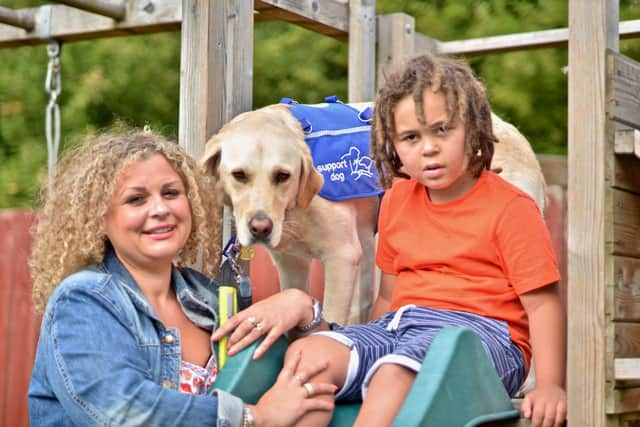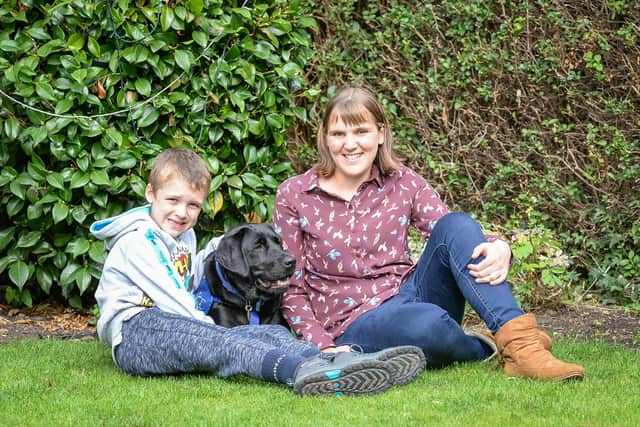Invisible Disabilities Week: How support dogs have helped reduce judgement on Yorkshire families
It’s true they didn’t know her boy has sensory difficulties, meaning he struggles with noise and crowds and has little sense of danger, but it was hard not to feel upset and bothered by the stares and comments.
At the age of five, Sam was diagnosed with autism – and a year later, a depression diagnosis followed too. For a while, he couldn’t leave the house, never felt safe and had “lost his smile”, mum Emma, from Sheffield, says.
Advertisement
Hide AdAdvertisement
Hide AdBut things started to improve in 2017, when support dog Willow entered Sam’s life. The now eight-year-old black Labrador, who was trained by the Sheffield-based Support Dogs charity, has been instrumental, Emma says, in helping to improve understanding and reduce judgement when the family are out and about.


“Prior to having Willow, when Sam was dysregulated in public and may run away, get upset, scream, shout, swear and maybe lash out, people would look at him like he was a naughty child.
"They would stop and stare and you could feel their judgement, or other mums would ignore us or look the other way walking to and from school. This all changed with Willow - we started to get smiles or at the very least not stopped and judged. People were more likely to offer support like a quiet room to wait in or give us more space and privacy.
“Having Willow turned stressful and uncomfortable situations in public to something more positive for everyone. Instead of staring and seeing a naughty boy, people would look and see a boy being comforted by his support dog.”
Advertisement
Hide AdAdvertisement
Hide AdEmma is speaking during Invisible Disabilities Week this week, which aims to highlight non-apparent, or hidden disabilities and break down barriers by making people more aware of the different types of conditions people have to manage on a daily basis.


Emma says Willow has helped to make Sam’s invisible disability more visible, as well as taking the focus off Sam during difficult moments.
“Willow took the burden of social stares away from Sam and absorbed it all for him,” she explains. “She would lay down with him and he would lay his head under hers and then she put her paws over him. She's very protective of him and would always lay in such a way Sam could hide from the world when it got too much.”
They once spent an hour on Llandudno Pier in Wales with Willow laying on Sam while he managed to find calm.
Advertisement
Hide AdAdvertisement
Hide Ad“Instead of hearing people make judgemental or upsetting comments, we could hear people saying how amazing Willow was, and ‘look at that dog!’,” Emma reflects.
“The pressure it took off of us all as a family was amazing, it was such a relief for us all to know that Willow took away that burden of judgement, awkwardness and upset when Sam did struggle when we were out - not only for Sam but for the whole family.”
The dog has also made places more accessible for Sam, Emma says. When people see him with Willow, it can open their minds to what he might need and has led to offerings of quiet spaces and music being turned down with no questions asked.
Kelly Neylon, from Hull, can empathise with the family’s experiences. Her 13-year-old son Louis is also autistic and has had global development delay since he was seven. Louis has limited speech and has occasional meltdowns in public. Kelly says: “You do get the reaction that he’s a naughty child. When he was younger, people just thought he was a typical cute child having a tantrum, and went about their business.
Advertisement
Hide AdAdvertisement
Hide Ad“But now he’s older and he’s quite a big lad, the looks you get from people are different – people do stare as because he’s big it can look quite scary. You try not to let it bother you, but it does bother you.”
Louis’ support dog Iggy has made a real difference to how he makes sense of the world – and how others perceive him, Kelly says. The yellow Labrador has helped to make people more aware of Louis’ condition. “It’s good to have Iggy out and about with his Support Dogs jacket on, just to highlight Louis’ condition.
"You don’t have to explain yourself to strangers,” Kelly says. “People seem to be more understanding than if you haven’t got the dog.
“The UK is quite a dog-loving nation, so it’s a talking point and people will be more accepting and approach Louis more. People will say ‘what’s your dog’s name?’ and it encourages social interaction. It also encourages Louis to talk to someone he wouldn’t normally talk to – it helps build up social situations autistic people struggle with.”
Advertisement
Hide AdAdvertisement
Hide AdEmma agrees, describing how in talking about Willow, Sam can connect with other people. "She has become the focus for people so instead of raising Sam's anxiety by trying to talk to him they talk to Willow or ask about Willow and this reduces that social pressure on Sam.”
Of the one in five people in the UK who have a disability, it is reported that around 80 per cent have a hidden disability.
A research briefing to parliament on invisible disabilities earlier this year said lack of understanding and stigma from others creates “consistent barriers” in the lives of people with invisible disabilities and noted many report unequal opportunities and difficulties accessing the services and support they need.
Invisible Disabilities Week runs until Saturday, October 21 and is about raising awareness and offering support to people with invisible disabilities around the world.
